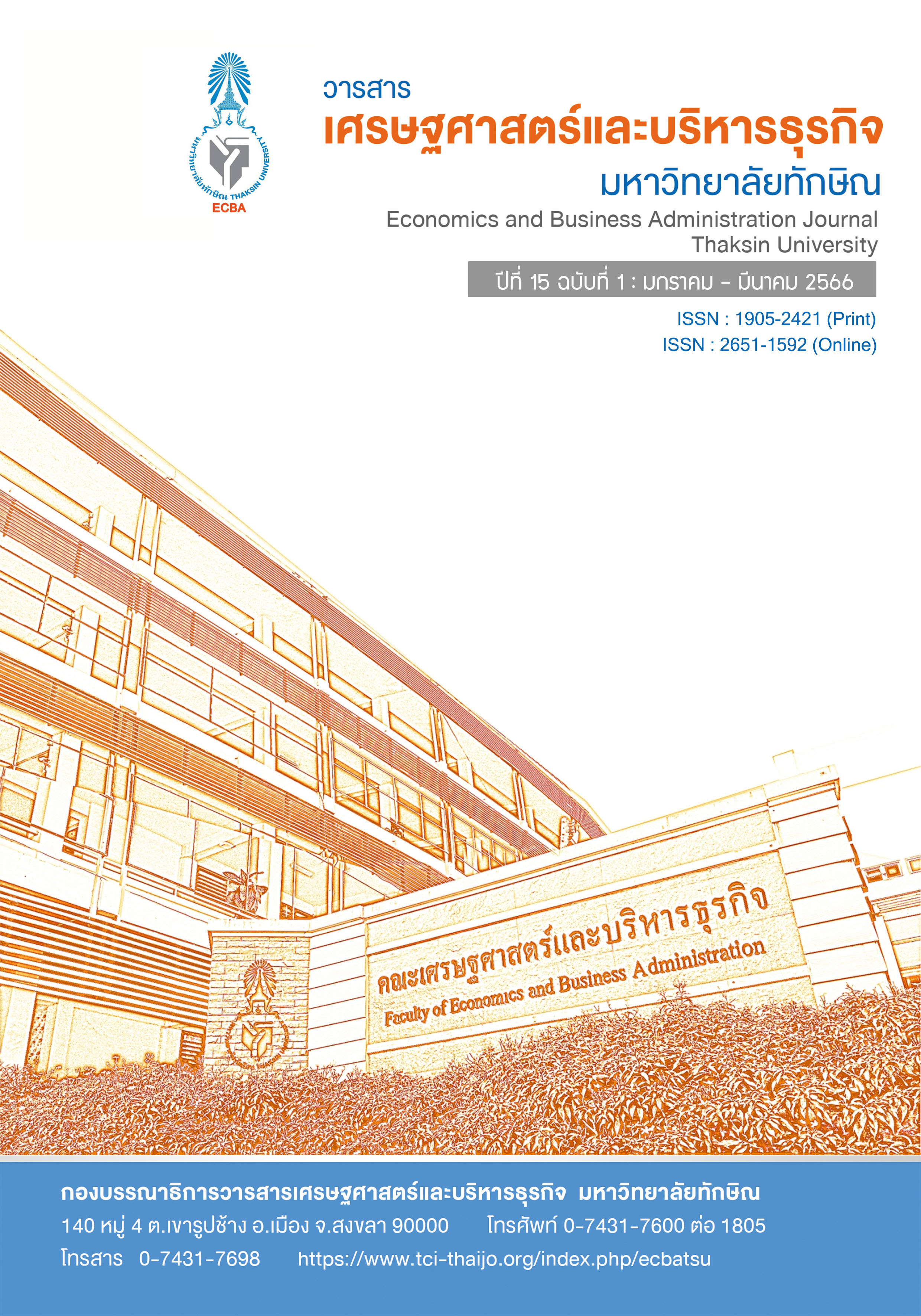Personal Finance Management of the Accountancy Program Students during the Covid-19 Pandemic
DOI:
https://doi.org/10.55164/ecbajournal.v15i1.251465Keywords:
Financial knowledge, Personal finance, Financial behavior, The Covid-19 PandemicAbstract
The purposes of this study were to investigate knowledge level of personal finance management and personal financial behavior of the accountancy program students during the Covid-19 Pandemic as well as to examine the comparison between personal factors, knowledge level of personal finance management, participation in government aid programs and financial behavior of those students. Online questionnaires were utilized as a tool for data collection. The statistics employed in analysis including frequency, percentage, independent sample t-test, one-way ANOVA and Chi-Square. The results revealed that the students had expenses equal to incomes, which average monthly of 3,001 to 6,000 baht. Majority of the accountancy program students had a relatively good level of financial knowledge and skills, yet it was not affect the personal financial behavior. The fourth year students had lower expenses on average than other years. Furthermore, the results also found that female students saved more money than male students. The most common channel to save money was to deposits with commercial banks. However, the students as a whole had little or no savings and investment, which had an average monthly savings of less than 1,000 baht. Briefly, it also found that the students participating in government aid programs were aware of how appropriate spending was and thus affected to their saving behaviors.
References
Chansawaang, T. (2018). Factors influencing personal financial planning behavior of undergraduate students Siam University. Unpublished Master Independent Study. Bangkok: Siam University.
Chirdchupunseree, H., & Chantuk, T. (2016). The pattern analysis of spending from demand for money of nursing students in private university. Veridian E Journal, Silpakorn University (Humanities, Social Sciences and Arts). 9(2), 597-609.
Faul, F., Erdfelder E, Lang A-G., & Buchner A. (2007). G*power: a flexible statistical power analysis program for the social, behavioral, and biomedical sciences. Behavior Research Methods, 39(2), 175-191. doi: 10.3758/BF03193146.
Gaiyafai, W., Surasook, A., Susunnoen, N., Suwithamma, S., & Charatiam, N. (2020). Saving behavior of the student at Nakhon Ratchasima Rajabhat University. Science and Technology Research Journal Nakhon Ratchasima Rajabhat University, 5(1), 31-42.
Hair, J.F., Black, W.C., Babin, B.J., & Anderson, R.E. (2010). Multivariate Data Analysis (7nd ed.). Upper Saddle River, NJ: Prentice Hall.
Inlakorn, S. (2020). An analysis of financial literacy of the student at Kasetsart University Sri Racha Campus. Interdisciplinary Sripatum Chonburi Journal, 6(2), 78-90.
Kruithern, V. (2021). Covid-19: New coronavirus threats to the world in 2020 [Online]. Retrieved on January 5, 2021 from https://www.bbc.com/thai/international-55217851.
Lappanichayakun, S. (2015). A Comparative study of undergraduate students' awareness and interest in personal financial planning Prince of Songkla University, Hat Yai Campus. (Minor Thesis). Songkhla: Prince of Songkla University.
Leekpai, P. (2020). Saving behaviors of undergraduate students in Trang Province. SSRU Graduate Studies Journal, 13(1), 111-126.
Lertpiang, S. (2014). Behavior in personal planning of the students majoring in accounting, Faculty of Business Administration, Lampang College of Commerce and Technology. Journal of Graduate Studies in Northern Rajabhat Universities, 4(6), 15-26.
Namphut, S., Jaroenjitrkam, A., & Wiwattana, S. (2014). Personal Finance Management Strategy. Bangkok: Thammasat University Press.
Nati, T., Naraatcha, N., Sentima, M., Thuekaew M., Kheiwpakdee, R., & Thrawichakon, S. (2012). Saving behavior of the student at Chandrakasem Rajabhat University. (Research Report) Research and Development Institute Chandrakasem Rajabhat University. Bangkok: Chandrakasem Rajabhat University.
Ratanaprateepthong, S., & Thussanabanjong, N. (2020). Unemployed youth - the informal education system severe problem during COVID-19 [Online]. Retrieved on January 6, 2021 from https://www.bangkokbiznews.com/news/detail/893585.
Sahunan, S. (2018). Personal financial management behavior of Dusit Thani college students, Pattaya city. Dusit Thani College Journal, 12(2), 369-383.
Sangwichitr, K., Saengkassanee, T., Jirathumrong, P., Intara, P., Sangsuwan, S., & Cheejaroen, P. (2019). A comparison of knowledge and behaviors of Prince of Songkla University students in personal financial planning before and after attending a personal finance course. Hatyai Academic Journal, 17(2), 127-141.
Suktae, W., Wonglamthong, S., & Paipayob, T. (2019). A case study of Boromarajonani College of Nursing, Sawanpracharak Nakhonsawan. Journal of Graduate Review Nakhon Sawan Buddhist College, 7(2), 33-44.
Sukwattanasup, P. (2015). Factors of economics and environmental factors on savings are related to behavior of managing personal finances of working people in bangkok. Unpublished Master Thesis. Bangkok: Siam University.
Thaksin University. (2020). Social distancing measure to prevent the spread of Covid-19 [Face book page]. Facebook. Retrieved on June 26 2021 from https://www.facebook.com/we.tsu.ac.th/photos/a.849145495288323/1288353221367546.
Wornkhorporn, P. (2020). “Half-per-person” project ranked first most popular [Online]. Retrieved on January 7, 2021 from https://www.prachachat.net/economy/news-569660.
Downloads
Published
How to Cite
Issue
Section
License
Copyright (c) 2023 Economics and Business Administration Journal Thaksin University

This work is licensed under a Creative Commons Attribution-NonCommercial-NoDerivatives 4.0 International License.




